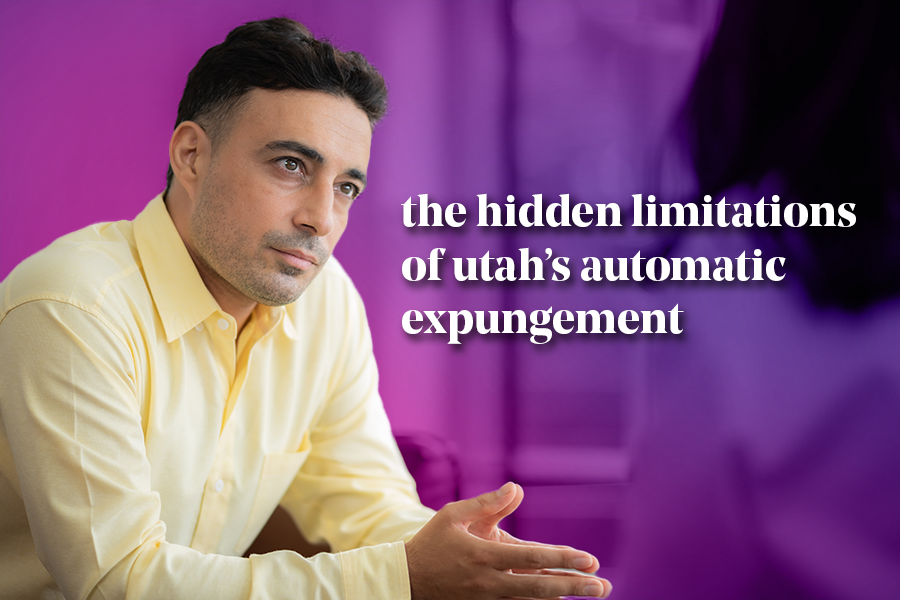Automatic expungement was introduced in Utah to help people clear old records without filing paperwork. That sounds great, but recent changes have made the process more complicated and less effective overall. Automatic expungement may still provide some benefits such as a simpler process, lower fees, and potentially favorable future eligibility considerations. However, there are also new requirements, delays, limitations, and strict rules that make it less helpful than it sounds.
Auto Expungement Has Limits
While auto expungement and petition-based expungement were meant to have the same effects, automatic expungement is not now as impactful as petition-based expungement. Most importantly, most agencies do not have to seal records from their database that were automatically expunged. This can limit the results of automatic expungement.
Some Records May Stay Public Even After Automatic Expungement
When your case gets cleared through automatic expungement, not every agency currently is required to seal the record. This is because of the way Utah law is written. The law currently only requires the Bureau of Criminal Identification (BCI) and the courts to expunge your record. Other agencies, including:
- Department of Corrections
- Jails
- Police departments
- Prosecutors
do not currently have to delete your record from their database. Because your record is not totally sealed or removed from public access, some records may be accessible. Your record may still be available to the public, and as of now, there is no way to ensure sealing at all agencies through auto expungement. Petition-based expungement, on the other hand, requires all of the above agencies at minimum to seal records.
Background Checks May Still Reveal Records
Many background check companies only use records from the courts and BCI. Still, some in-depth background checks access jail, Department of Corrections, and other agency records too. Since those institutions don’t currently have to seal automatically expunged records, your record could still show up on a background check. Basically, automatic expungement may not completely stop a record from interfering with housing, employment or other parts of life.
There Is No Guaranteed Timeline for Automatic Expungement
Not only is automatic expungement potentially incompete, it also does not have a clear time-line. Until recently, auto expungement used to be just that- automatic. A record was identified and then removed from court and agency records. But, there was no way to know when a record may be pulled for automatic expungement once eligible. Currently, this more automatic program is on pause until at least January 2026 and instead someone must submit an application for automatic expungement with the court to initiate the process. But, there is no timeline on the application.
Even if approved by the courts, automatic expungements are processed by BCI at a lower priority than petition based expungements. Because of this, you may have to wait longer before the record is sealed by the courts and BCI. Once the more automatic process resumes, there also will be no guaranteed period for selection or processing of the expungement. While Utah is trying to create legislation to solve this problem, it is still something to consider if you are getting a record automatically expunged.
Auto Expungement Has No Deadline
In Utah, there is no guarantee of the timeline of when a record is expunged automatically if initiated by the courts. You could wait years for your record to be cleared, even for minor or traffic charges. If you submit an application for automatic expungement to the court it will jumpstart the process, but it is unclear how long it may take to process the expungement if it is approved. If you get an expungement by a petition instead, the court must make a decision on the expungement within a set period of time. Unpredictable processing times can be frustrating, and they are a real limitation for auto expungement.
New Laws Try to Help
One of the reasons that automatic expungement does not have a set time-frame is because Utah’s system has bottlenecks. Utah passed new laws to try and improve the process including HB 352, which put a pause on the automatic expungement process and created an application-process for backlogged auto expungements.
The state passed this law and others with the goal of easing the burden on the system and finding solutions to some of these problems. Still, the wait-time problem hasn’t been fixed yet.
Stricter Rules for Eligibility
In addition to the problems outlined above, automatic expungement also has strict eligibility rules. Qualifying for petition-based expungement can be easier and typically has shorter required wait times for eligibility. You can read more about the eligibility rules for petition-based expungement in our learn section.
Eligibility Wait Times Are Longer
You typically have to wait longer to become eligible to clear a crime automatically than if you petition the court to clear it. For example, a class B misdemeanor becomes eligible for auto expungement six years after the conviction date. However, you can file a petition to expunge a class B misdemeanor four years after the case finishes. In addition, a class B dismissal without prejudice requires a six year wait whereas it can be eligible for petition based expungement 180 days after dismissal. This means that petition-based clearing usually has shorter eligibility wait times than automatic expungement.
Fewer Offenses Qualify for Automatic Expungement
Finally, auto expungement only works for certain types of records. Felonies and most class A misdemeanors do not qualify for automatic expungement. Also, certain types of lower level misdemeanor cases, such as domestic violence and DUI type cases, are not eligible for automatic expungement. These offenses may not qualify even if the case was dismissed through a plea in abeyance agreement. Finally, if 10 years have passed since you were last convicted, incarcerated or on probation or parole, you may qualify for petition based expungement while not qualifying for automatic expungement on any convictions, depending on the number of convictions on your history.
If you file a petition you may still be able to get those records expunged. In other words, auto expungement has a more limited scope than petition based expungement, which can make it a less effective option.
What’s Next?
Utah lawmakers created automatic expungement to be an easy, accessible road to expungement. Right now, however, it is not as effective as petition based expungement. Auto expungement does not totally delete a record, it has indefinite processing times, does not include all cases, and you must wait a longer amount of time for eligibility.
Because of these draw-backs, petition-based expungement is often a more reliable option than automatic expungement. If you would like to pursue a petition-based expungement, you’re in the right place! Rasa offers petition-based expungements. You can start that process by checking your eligibility here.




